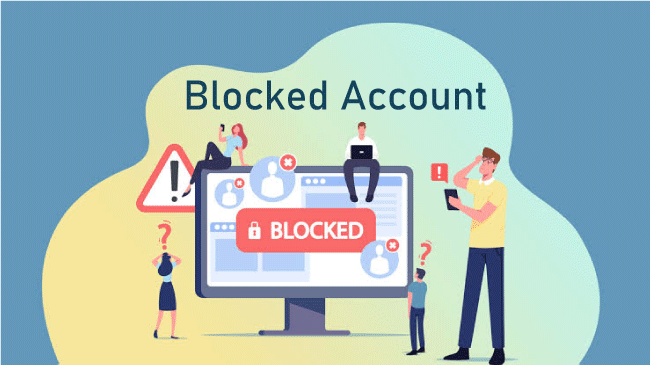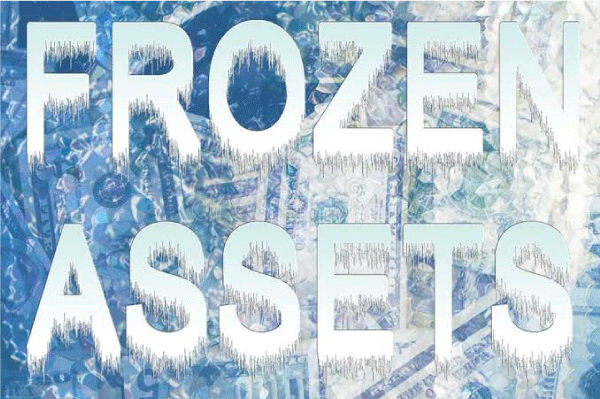Blocked AccountWhat is a Blocked Account?A bank account with temporary or permanent constraints or restrictions imposed on it is called a "blocked account". Accounts may be restricted or barred for several reasons, such as internal bank policy, laws outside the country, or as a result of a court order or other legal action. A frozen account usually results in a complete loss of access to all services. 
Understanding the Concept of Blocked AccountsAn account with specific limits or constraints on when, how much, and by whom money may be removed is commonly called a blocked account. This is because restricted accounts do not provide unrestricted or indiscriminate withdrawals or other access. Accounts may be frozen this way for various reasons, including those mandated by bank policies or court orders from outside jurisdictions, such as when assets are divided after a divorce or when a person declares bankruptcy. For example, a bank may have a policy limiting cash transactions to $2,000 per week for its regular clients, or a court may decide that neither party to a divorce may take more than $500 per week from bank accounts for personal purposes. Failure to comply with these conditions may result in the blocking of respective accounts. An account is referred to as -frozen" if it is entirely blocked. Freezing an account often follows a court order; however, the bank occasionally takes the initiative. This often happens when questionable activity is discovered on the account; the account holder owes money to creditors, the authorities, or both. Foreign Exchange ControlsAn account liable to foreign exchange regulations, which restrict the amount of a nation's currency that may be moved to other nations or exchanged for other currencies, might be said to be frozen. German Blocked AccountsThis is a unique kind of German bank account made just for foreigners who want to move to Germany to study, look for work, or participate in the au-pair program. When you are arranging your paperwork for your visa form in your home country or, maybe, when you are already in Germany and want to apply for a residence permit, the blocked account must be created at a German bank. With this kind of bank account, you may assume that your money will be -blocked" for the time you spend visiting Germany. German regulations define the required transfer amount as an assurance that you can maintain an acceptable level of life overseas. Even though the money is stored in your name and belongs to you entirely, you can only access a portion of it once. Instead, you get a monthly stipend into a conventional bank account that you create at the German bank of your choosing. The company you have chosen to create your account with will provide a so-called -blocking confirmation" as soon as you pay the appropriate amount. When you apply for a visa or resident permit, the government will need you to present this paperwork. It serves as your financial justification. For international students not from member nations of the European Union (EU), restricted or blocked accounts, or Sperrkonto as they are known locally, are a unique kind of bank account. You must demonstrate as an international student that you have the financial resources to pay for your academic program and your living expenses while you are enrolled in classes. And a banned account is frequently needed to demonstrate acceptable means. The account owner does not have unrestricted access to this account. Students must pay an average of 934 euros monthly for the months they anticipate spending in Germany. They are permitted to withdraw money once they are in Germany, and they are permitted to take up to 934 euros a month unless they have paid more than the minimum monthly amount. Why is a Blocked Account Required in Germany?Learners from non-EU nations must be aware of several governmental conditions in addition to the entrance requirements set by institutions, particularly when registering for a German (student) visa and attending to all necessary procedures. One of these conditions is that students must present documentation of their financial standing to the embassies to show that they have the means to support themselves while studying abroad in Germany. Opening a Blocked Account with a German bank is among the most popular techniques. Please note that there may be differences between the criteria for a blocked account created for residence authorization and the criteria for a blocked account opened for an admission visa to Germany. It is crucial to be aware of these variations in advance and choose a Blocked Account supplier who complies with all applicable laws. For the local foreign ministry to accept it as a residency permit, several students frequently need to register a second Blocked Account. Taking this step before arriving in Germany will save time and money. Deposit Account ControlsThe lenders, borrowers, and banks enter into a tri-party arrangement known as a deposit account control agreement (DACA). Command under DACA is created when the bank consents to follow instructions from the safe and secure lender without requiring the borrower's express accede. These are frequently referred to by different, occasionally more well-known terminology, such as -lockbox agreement", -control agreements", and "account control agreements" (or "ACAs"). A DACA gives the lender a security interest in the consumer's bank account. This gives a lender complete control over how the money for their loan is dispersed and offers some security for the lender if the borrower defaults. The lender can manage the money transfer from the borrower's account, freeze those funds if required, and issue their directives. The DACA's conditions will determine whether or not the borrower has immediate access to the account's cash. Borrowers may access the money in DACAs that are -non-invoked" or -springing", but they cannot access in DACAs that are -invoked" or -blocked". Remember that a lender may alter these conditions at any moment and as often as possible through -invoking" or -un-invoking". Multiple accounts may be included in a single DACA, but they must all have the same status, either invoked or not. It's also vital to remember that DACAs are perpetual and do not need to be renewed. Benefits of DACAsDACAs offer advantages to the lenders who use them. DACAs essentially offer safety and security from borrower default, allowing lenders to reduce the risk associated with a loan by having the option to begin collecting payments if something goes wrong. The parties often desire the involvement of a third party because it gives them confidence that the contract will be upheld according to its provisions. DACAs are very adaptable as well. Lenders can create distribution plans that best fit them by working with a bank, such as permitting weekly borrower disbursements or forbidding unapproved withdrawals. Frozen Assets
A blocked account can also refer to an account frozen by the US administration due to political considerations or for other causes, including the account holder's passing. The phrase "frozen account" implies that the situation is long-term and is generally more serious than -blocked account". No money in an American account can be accessed without special clearance from the U.S. Treasury once it is frozen by government order (for example, during a war or emergency). Goods owned by individuals or companies that cannot be exchanged or sold because the respective owners owe money to someone (person or government) are referred to as frozen assets. A debtor's assets are usually frozen if they fail to pay a debt. It is done to recover debts from the frozen assets since there is no other way to get the money back. This may include anything fully owned by the debtor that the nation does not consider immune from the debt collection company, such as automobiles, real estate, and bank accounts. Even if the individual or business cannot lose their possessions when their assets are frozen, they cannot access the restricted property. Due to this, many businesses may go out of business. Many people may lose their livelihoods and material possessions because they cannot sell or exchange them for paying off other obligations. For example, if a person borrows money to buy a new automobile but is not obliged to put up any collateral, a few things may occur if they do not pay off the obligation. The lender has the right to freeze this person's bank account if he suffers an accident, damages the automobile, or has insufficient insurance to cover the costs. This (block or freeze of accounts and assets) is done in the hope that the courts will pay the money in the lender's account from the person's account to whom the money is owed. Blocks or freezes are often done until a court appearance can be called. Distinct jurisdictions have various laws and ordinances governing frozen assets, including everything from bank accounts to homes. When this happens to a certain person's bank account, he won't be able to take out any money till the problem is fixed. The worst thing about these kinds of seized assets is that the amount will also be deposited and kept in the account if regular deposits are scheduled to occur. A locked account will remain locked if a court appearance is ongoing and a winner has not been determined. This also applies to things like houses, cars, and other valuable possessions not utilized as collateral. A corporation that has its assets frozen may be forced to declare bankruptcy to access its operational money. This implies they won't be able to sell their belongings or automobiles to pay off debts. This kind of lock will also negatively impact their future by alerting other creditors and lenders to a prior incidence of them failing to make payments on time and coming up with a reasonable payment schedule to settle the past-due debt. What happens to a blocked account?When an account is blocked, the owner often has temporary or permanent limitations on utilizing the cash inside. Can money be sent to a Blocked Account?Depending on the account's nature and why it was blocked, reserves are rarely a problem; withdrawals are. This means that credits are often allowed, but debits are not. In addition, there may be times when all transactions are restricted, for example, if a government closes a bank account. How does a Blocked Account operate in Germany?Non-EU students must substantiate that they have the means to support themselves while studying in Germany. It may be necessary to pay a minimum of €11,208 per year, or €934 per month, into a German -blocked" account as of 2022. There is a restriction on who can use this money. Money cannot be taken out until the traveler lands in Germany. Secondly, once they do, it is impossible to withdraw more than €861 every month unless more than the minimum investment is made each month. The Bottom LineThe word -blocked account" has several definitions in commerce and finance. It can describe any situation in which a bank account has certain constraints or constraints imposed upon it, such as an account subjected to foreign currency controls, the German -Sperrkonto", a Deposit Account Control Agreement (DACA), frozen assets, etc. In general, blocked accounts are disturbing since they limit the ways that account users may use money.
Next TopicCash Accounting
|
 For Videos Join Our Youtube Channel: Join Now
For Videos Join Our Youtube Channel: Join Now
Feedback
- Send your Feedback to [email protected]
Help Others, Please Share









